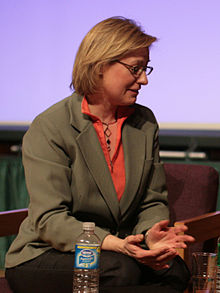Rosalind Picard
| Rosalind Picard | |
|---|---|

Rosalind Picard at the Veritas Forum Science, Faith, and Technology session on "Living Machines: Can Robots Become Human?"
|
|
| Born | May 17, 1962 |
| Institutions | MIT |
| Alma mater | MIT |
| Thesis | Texture Modeling: Temperature Effects on Markov/Gibbs Random Fields (1991) |
| Doctoral advisor |
Alex Pentland Jae Soo Lim Sanjoy K. Mitter |
|
Website web |
|
Rosalind Wright Picard (born May 17, 1962 in Massachusetts) is Professor of Media Arts and Sciences at MIT, director and also the founder of the Affective Computing Research Group at the MIT Media Lab, co-director of the Things That Think Consortium, and co-founder of startups Affectiva and Empatica. In 2005, she was named a Fellow of the Institute of Electrical and Electronics Engineers.
Picard is credited with starting the branch of computer science known as affective computing with the publication of Affective Computing. This book described the importance of emotion in intelligence, the vital role human emotion communication has to relationships between people, and the possible effects of emotion recognition by robots and wearable computers. Her work in this field has led to an expansion into autism research and developing devices that could help humans recognize nuances in human emotions.
Picard holds a bachelor's degree in electrical engineering with highest honors and a certificate in computer engineering from the Georgia Institute of Technology (1984), and master's (1986) and doctorate degrees (1991), both in electrical engineering and computer science, from MIT. Her thesis was titled Texture Modeling: Temperature Effects on Markov/Gibbs Random Fields. She has been a member of the faculty at the MIT Media Laboratory since 1991, with tenure since 1998 and a full professorship since 2005.
Picard is a researcher in the field of affective computing and the founder and director of the Affective Computing Research Group at the MIT Media Lab. The Affective Computing Research Group develops tools, techniques, and devices for sensing, interpreting, and processing emotion signals that drive state-of-the-art systems that respond intelligently to human emotional states. Applications of their research include improved tutoring systems and assistive technology for use in addressing the verbal communications difficulties experienced by individuals with autism.
...
Wikipedia
